Salesforce Automation Software: What It Is And How It Works
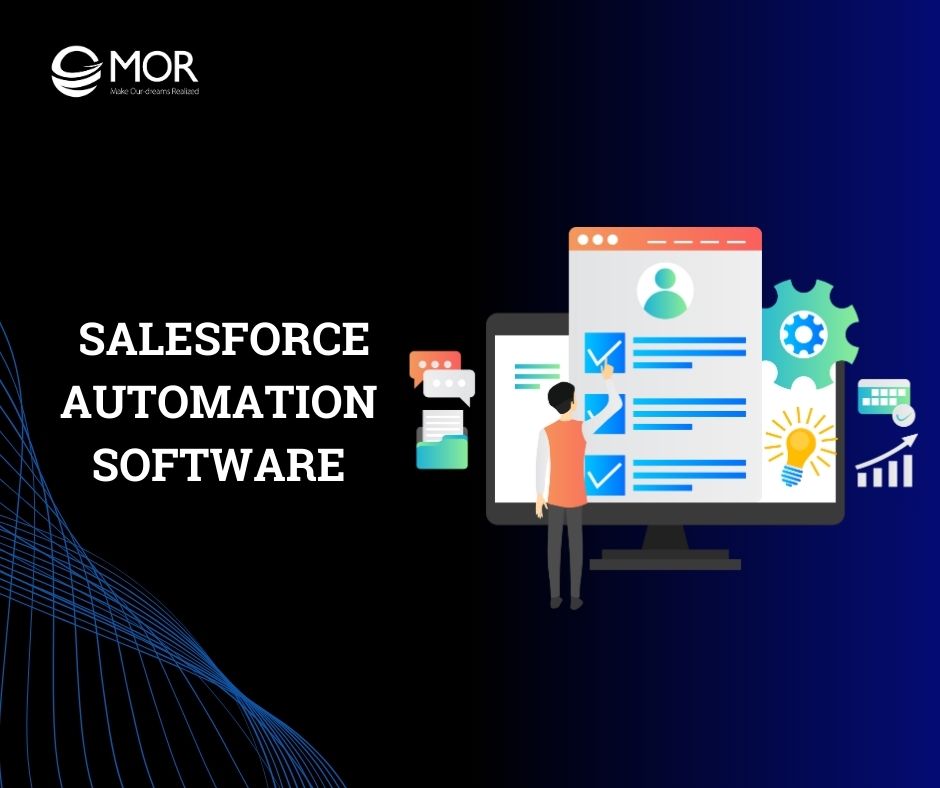
Is your business facing challenges in optimizing sales processes and improving the efficiency of your sales team? In today’s era of digital transformation, implementing salesforce automation software has become a strategic solution that enables businesses to automate processes intelligently and effectively. In this article, MOR Software, as a professional and trusted partner, will help your business explore key insights and practical information about this powerful solution.
What Is Salesforce Automation Software?
Salesforce automation software is a tool that helps businesses automate their sales processes. This software increases work efficiency, reduces manual errors, and optimizes time for sales teams.
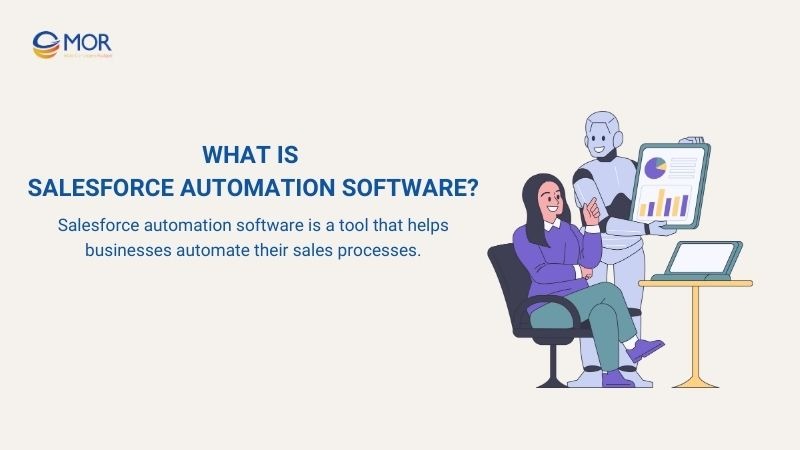
Additionally, the software offers tools for analyzing customer data and sales performance, allowing businesses to identify high-value opportunities, track the sales pipeline, and make informed, data-driven strategic decisions. By leveraging these insights, sales teams can work more effectively, improve conversion rates, and enhance overall customer experience.
>>> Salesforce custom development helps businesses escape rigid CRM setups and build systems that truly fit how teams work. Let's take a look!
How Does Salesforce Automation Software Work?
Salesforce automation software automates key sales processes, helping businesses manage customers and opportunities more effectively. Below are the main steps this software takes in daily sales operations:
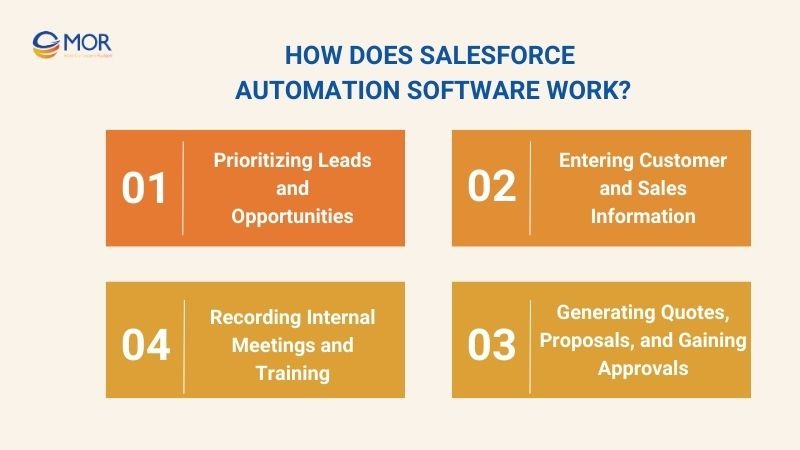
Prioritizing Leads and Opportunities
Salesforce automation software automatically categorizes potential leads based on customer interactions with the business, such as opening emails, visiting the website, or responding to marketing campaigns. Each lead is scored automatically (lead scoring) to determine its potential.
Flow:
- Collect customer interaction data from multiple channels.
- Perform automatic lead scoring to assess potential.
- Rank opportunities to identify high-value prospects.
- Update the CRM software so sales teams can monitor progress and plan engagement.
Entering Customer and Sales Information
The software automatically captures customer information from various channels, including emails, websites, and online forms. The collected data is integrated directly into the CRM, creating a single source of truth that the sales team can rely on without manual data entry.
Flow:
- Gather data from multiple channels.
- Validate and standardize the information to avoid errors.
- Update the CRM to create a synchronized customer profile.
- Track opportunity status and contact details for a comprehensive view of each client.
This ensures that sales teams have accurate, up-to-date information to make informed decisions and respond quickly to opportunities.
Generating Quotes, Proposals, and Gaining Approvals
Salesforce automation software provides pre-built templates for quotes and proposals, allowing sales reps to create documents quickly while maintaining accuracy and consistency. Approval salesforce workflows are automated, enabling managers to review and approve without interrupting the sales process.
Flow:
- Select a pre-built quote or proposal template.
- Enter customer and product information; the system automatically calculates pricing and discounts.
- Send an approval notification to the manager.
- Manager approves directly in the software → quote/proposal is sent to the customer.
Example: When creating a quote for a new client, the system automatically calculates discounts based on transaction history and pricing rules, then sends an approval request to the manager. Approval is completed in 1–2 hours instead of several days, shortening the sales opportunity lifecycle.
Recording Internal Meetings and Training
The software also supports recording and storing information from meetings and internal training sessions. All guidance, processes, or discussion outcomes are stored in the system, creating a centralized knowledge base for the sales team.
Flow:
- Record meeting notes and store training materials.
- Sync information into the centralized knowledge system.
- Allow team-wide access for reference, collaboration, and sharing.
- Continuously update the information to improve training effectiveness and overall sales operations.
This ensures that critical knowledge is preserved, new hires can learn faster, and the team can continuously enhance sales performance.
Top 5 Salesforce Automation Software Widely Used Today
In the era of increasing sales automation, choosing widely used and effective salesforce automation software helps businesses optimize their sales processes. Here are five prominent Salesforce tools that many companies currently rely on:
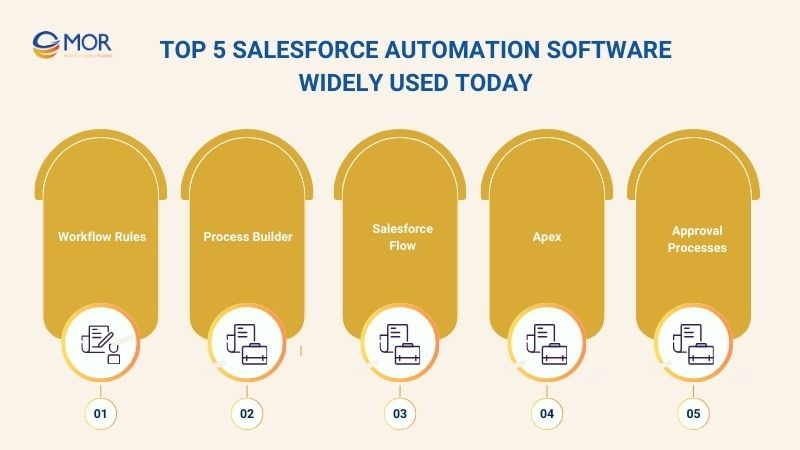
Workflow Rules
Workflow rules in salesforce automation software allow businesses to set up rules that automatically trigger actions when certain conditions are met. For example, when an opportunity reaches the “Negotiation” stage, the system can automatically send email notifications to managers or create follow-up tasks for sales representatives.
Using workflow rules reduces manual tasks, ensures customer information is updated promptly, and prevents important opportunities from being missed. When integrated with CRM platforms, workflow rules help manage customer data, track opportunity progress, and enhance overall sales process efficiency.
Process Builder
Process builder within Salesforce automation software enables companies to create more complex automated processes than workflow rules. When an event occurs or data changes, the system can perform multiple actions simultaneously.
Implementing process builder optimizes workflows and ensures synchronized handling of customer interactions and sales opportunities. When combined with CRM solutions, businesses can monitor and control automated processes clearly, reduce manual errors, and boost sales effectiveness.
Salesforce Flow
Salesforce flow is a powerful tool in salesforce automation software that allows businesses to design automated flows for interacting with users or data visually. These flows can guide sales representatives through step-by-step processes, collect customer information, or automate decision-making based on data conditions.
With salesforce flow, companies can reduce manual work, improve both employee and customer experience, and ensure every sales opportunity is processed accurately. When integrated with CRM platforms, Flow helps managers and sales teams track processes efficiently and handle opportunities on time.
Apex
Apex is Salesforce’s proprietary programming language, used in salesforce automation software to customize and extend automation processes. With Salesforce Apex, businesses can build tailored solutions that meet complex requirements not achievable with workflow rules or Process Builder.
Approval Processes
Approval processes in salesforce automation software help businesses automate approval workflows for quotes, contracts, discount requests, or special offers. When a record or opportunity is created or updated, the system automatically routes it to the appropriate approver based on predefined rules.
Using approval processes shortens approval times, ensures consistency and transparency, and reduces manual errors. When integrated with CRM platforms, businesses can track approval statuses easily and enhance the efficiency of sales opportunity management.
Criteria | Workflow Rules | Process Builder | Salesforce Flow | Apex | Approval Processes |
Purpose | Automate simple triggers | Multi-step process automation | Visual flow design | Custom-coded automation | Automate approvals |
Strength | Quick setup, reliable notifications | Handles complex workflows, flexible logic | Guided steps, advanced automation | Highly flexible, supports advanced logic | Fast, transparent, standardized |
Limitations | Limited actions, basic conditions | Can get slow with many processes | Steeper learning curve | Requires coding skills | Limited to approval scenarios |
Best Use Case | Task reminders, email alerts | Customer onboarding, sales follow-ups | Data collection, conditional decisions | Unique business needs, complex automation | Contracts, quotes, discount approvals |
Ease of Use | Easy | Moderate | Challenging | Developer only | Easy |
Why Should Businesses Use Salesforce Automation Software?
Using salesforce automation software helps businesses optimize their sales operations and customer management efficiently. Here are the key benefits that companies can achieve by implementing this software:
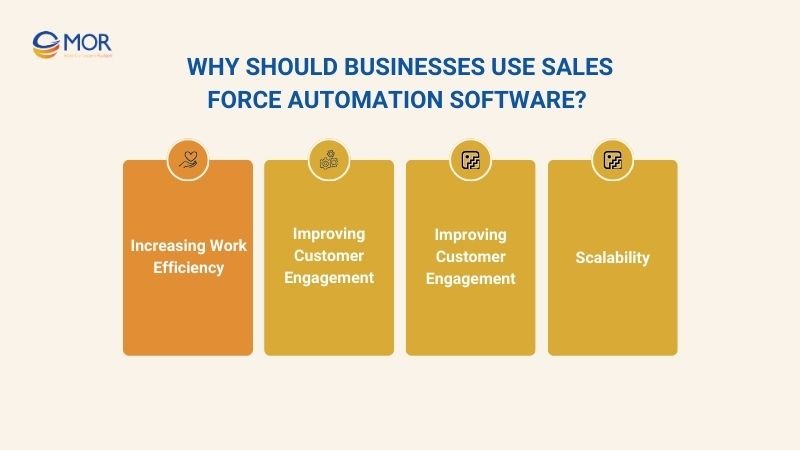
Increasing Work Efficiency
Using salesforce marketing automation software enables businesses to automate repetitive administrative tasks. This allows sales teams to spend more time on strategic activities, including customer care and developing new opportunities.
Automation reduces manual errors and improves overall productivity, helping businesses run their sales processes smoothly and efficiently. According to a study from ResearchGate, implementing Salesforce CRM can reduce 75% of the time spent on manual tasks and improve customer response times.
Improving Customer Engagement
With marketing automation software salesforce, businesses can communicate with customers in a personalized, timely, and accurate manner based on real behavior. This enhances customer satisfaction, fosters long-term relationships, and increases repeat purchases as well as customer lifetime value.
The system also optimizes marketing and sales campaigns, ensuring messages are sent at the right time and tailored to individual customer needs. By using Salesforce automation software, companies can identify high-value prospects and increase conversion rates effectively.
Improving Customer Engagement
Using salesforce automated testing software, businesses can track and analyze sales performance in real time. Aggregated data from CRM platforms allows managers to accurately evaluate team performance, identify potential opportunities, and address issues promptly.
The software optimizes sales approaches, increases deal closure rates, improves decision-making, and boosts market competitiveness. Studies show that 94% of companies report increased sales productivity after implementing CRM, with 44% experiencing a productivity boost of 10% to 29%.
Scalability
Implementing marketing automation software that integrates with salesforce allows businesses to expand their sales teams and customer base while maintaining operational efficiency. The software adapts to new processes, changing markets, and complex campaigns.
As a result, companies can grow sustainably, maximize the effectiveness of Salesforce automation software, and fully leverage the potential of their sales teams.
Key Features Of Salesforce Automation Software To Know
Salesforce automation software offers a range of essential features that help businesses optimize their sales processes. Here are the key features that companies should understand to fully leverage the capabilities of the software.
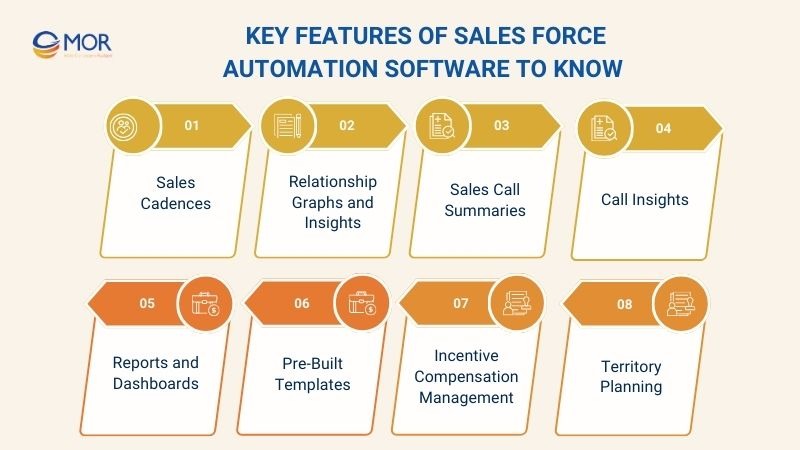
Sales Cadences
One of the key features of salesforce automation software is sales cadences, which are structured sequences of calls, emails, and follow-ups. With sales cadences, sales representatives can automatically track email schedules, call reminders, and follow-up actions.
This reduces human error, optimizes working time, and increases customer response rates. Integrated with other tools in salesforce marketing automation software, sales cadences help businesses execute a professional and efficient sales process.
Relationship Graphs and Insights
The relationship graphs and insights feature in salesforce automation software allows sales teams to visualize connections between customers, stakeholders, and decision-makers. Combined with CRM data, this feature enables businesses to detect high-value opportunities, optimize engagement strategies, and personalize interactions.
Sales Call Summaries
Another important function of salesforce automation software is sales call summaries, which automatically record the content of sales calls. Sales representatives no longer need to take manual notes, and all important information is stored directly in the CRM.
This allows teams to quickly reference past conversations, track customer progress, and prepare accurate next steps. Managers can also monitor call quality, evaluate employee performance, and improve overall sales workflows.
Call Insights
With call insights in salesforce marketing automation software, AI analyzes voice tone, keywords, and customer sentiment during calls. Sales reps receive actionable insights into customer needs and preferences, allowing them to adjust communication strategies effectively.
This feature enhances call quality, increases positive responses, and creates a more professional customer experience. When combined with relationship graphs and insights, businesses can implement data-driven sales strategies more efficiently.
Reports and Dashboards
The reports and dashboards feature in salesforce automation software enables real-time tracking of sales data, customer interactions, and performance metrics. Dashboards are customizable by role, allowing both managers and sales representatives to monitor revenue, pipeline progress, and KPIs.
This functionality helps companies evaluate campaign effectiveness, identify areas for improvement, and make data-driven decisions. It reduces errors, enhances management efficiency, and improves team productivity.
Pre-Built Templates
Salesforce automation software offers pre-built templates for emails, quotes, and proposals, allowing sales reps to quickly generate professional documents while maintaining consistent branding.
Using templates saves time, reduces manual errors, and ensures that messages to customers are consistent. When combined with sales cadences, these templates help businesses execute automated sales campaigns effectively.
Incentive Compensation Management
The incentive compensation management feature in salesforce automation software automates the calculation of commissions, bonuses, and incentives for sales teams.
Automation increases transparency, minimizes errors from manual calculations, and improves fairness in reward distribution. Employees can clearly see their performance results, which boosts motivation, productivity, and engagement with the company.
Territory Planning
With territory planning in Salesforce marketing automation software, businesses can efficiently assign customers and sales opportunities by region or segment.
This feature balances workloads among sales reps, optimizes coverage, and ensures no opportunities are missed. When combined with reporting and CRM insights, companies can adapt territory allocation strategies dynamically, improving overall sales productivity and efficiency.
How To Choose The Right Salesforce Automation Software?
Choosing the right salesforce automation software is a crucial factor for businesses to implement efficient sales processes. These steps help companies comprehensively evaluate options and select the salesforce marketing automation software that best meets their specific needs.
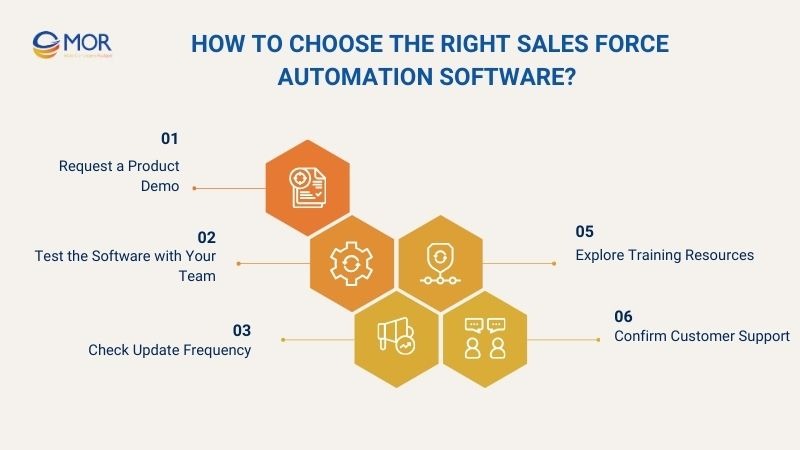
Request a Product Demo
One of the most important steps in selecting the right salesforce automation software is requesting a live product demo from the vendor. Experiencing the demo allows businesses to observe the user interface, core features, and the software’s ability to automate sales processes.
Through the demo, sales teams and managers can evaluate the software’s ease of use, integration capabilities with existing CRM systems, and efficiency in automating tasks. This step is crucial for determining whether the software meets the company’s real needs before making an official investment.
Test the Software with Your Team
After reviewing the demo, businesses should conduct trial sessions with their sales teams. This helps assess how salesforce automation software performs in daily workflows.
During the trial, companies can collect direct feedback from sales representatives regarding the interface, processing speed, integration with CRM platforms, and features. This feedback provides an accurate assessment of the software’s suitability and highlights any necessary adjustments before full-scale deployment.
Check Update Frequency
Regular updates ensure that new features are integrated, bugs are fixed promptly, and the system stays aligned with market trends. Businesses should review the vendor’s upgrade schedule, support for new versions of salesforce marketing automation software.
Regular updates help maintain software stability, prevent obsolescence, and ensure long-term efficiency in automated sales processes.
Explore Training Resources
To implement salesforce automation software effectively, companies need to evaluate the training resources provided by the vendor. This includes online learning portals, webinars, detailed guides, and tutorials that help employees get familiar with the software.
Comprehensive training ensures sales teams quickly master key features such as sales cadences, relationship graphs and insights, and pre-built templates. It also ensures users stay updated with new capabilities, enhancing operational efficiency and maximizing the benefits of the software.
Confirm Customer Support
Finally, businesses should verify the quality of customer support offered by the salesforce automation software vendor. Support channels like chat, email, phone, and 24/7 availability are crucial to ensure continuous software operation.
Reliable support helps quickly resolve issues and guides users on features such as incentive compensation management and territory planning. This enables companies to maintain stable sales operations and fully leverage the software’s capabilities.
Why Should Your Business Hire MOR Software For Salesforce Automation?
Selecting a trusted partner for implementing salesforce automation software is crucial for optimizing sales processes. MOR Software JSC stands out as a leading choice due to its expertise, proven track record, and commitment to delivering tailored solutions.
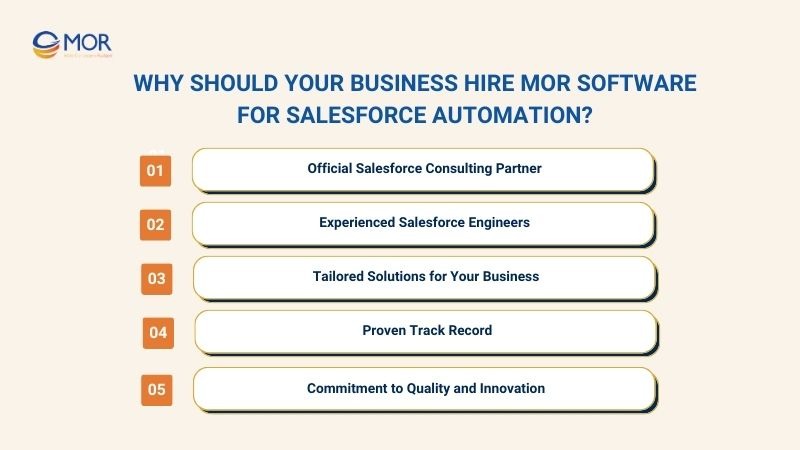
Reasons to Choose MOR Software:
- Official Salesforce Consulting Partner: MOR Software is a certified Salesforce consulting partner, ensuring adherence to best practices and access to the latest Salesforce features.
- Experienced Salesforce Engineers: The company boasts a team of skilled Salesforce engineers, many sourced from top-tier universities, bringing a wealth of knowledge and experience to each project.
- Tailored Solutions for Your Business: MOR Software offers customized Salesforce solutions that align with your specific business needs, ensuring optimal salesforce ERP integration and functionality.
- Proven Track Record: With years of experience in delivering Salesforce automation solutions, MOR Software has successfully assisted numerous businesses in enhancing their sales and customer service operations.
- Commitment to Quality and Innovation: Recognized for its dedication to quality and innovation, MOR Software continuously strives to deliver cutting-edge solutions that drive business success.
In Conclusion
Implementing salesforce automation software helps businesses optimize sales processes and enhance customer relationship management, and establish a strong foundation for sustainable growth. Contact MOR Software today to get expert advice on the right sales automation solutions, streamline your business processes, and boost the performance of your sales team.
MOR SOFTWARE
Frequently Asked Questions (FAQs)
Are CRM and Salesforce the same?
No, Salesforce is a CRM platform, while CRM (Customer Relationship Management) is a broader strategy and category of software.
Is SFA part of CRM?
Yes, Salesforce Automation (SFA) is a key component of CRM that automates sales tasks like lead management, forecasting, and reporting.
What is the difference between CRM and SFA?
CRM focuses on managing overall customer relationships, while SFA specifically automates sales processes such as lead tracking, pipeline management, and follow-ups.
Which automation tool to use in Salesforce?
The main Salesforce automation tools are Workflow Rules, Process Builder, Salesforce Flow, Apex, and Approval Processes.
Which automation tool is best for Salesforce testing?
Selenium, Provar, and ACCELQ are the most widely used automation tools for Salesforce testing due to their scalability and integration support.
What language is used in Salesforce automation?
Apex is the primary programming language for Salesforce automation, complemented by declarative tools like Flow and Process Builder.
How to set up automation in Salesforce?
To set up automation in Salesforce:
- Define the business process to automate
- Choose the right tool (Workflow Rules, Flow, Process Builder, Apex)
- Configure triggers, conditions, and actions
- Test automation in sandbox before deployment
Rate this article
0
over 5.0 based on 0 reviews
Your rating on this news:
Name
*Email
*Write your comment
*Send your comment
1